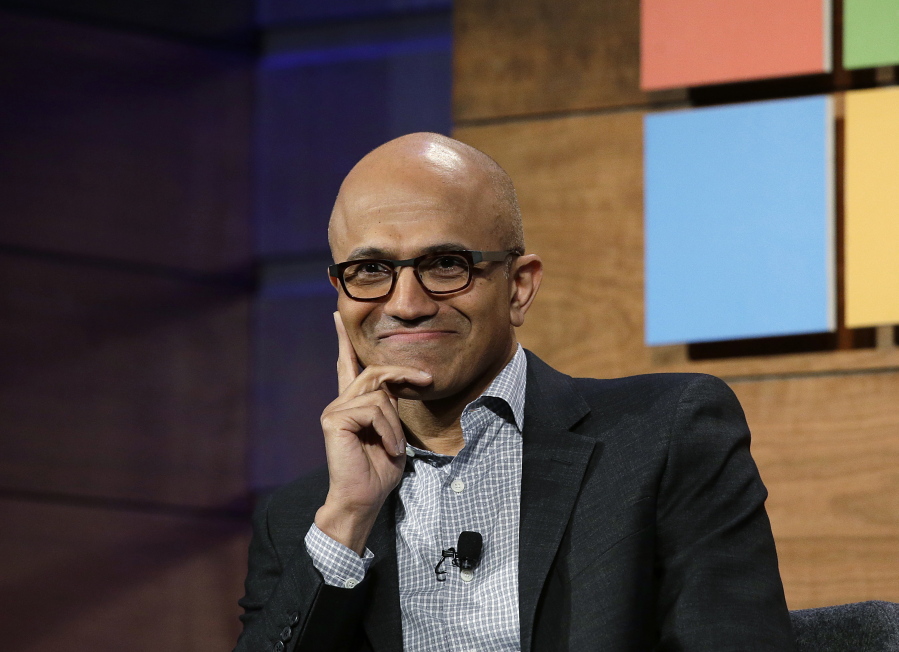Satya Nadella, the Microsoft CEO who kept the company relevant as its primary PC software business faded, could write a book about the challenges he faced.
And he has … but it’s not a tell-all memoir. Instead, Nadella, who has worked at the company since the early 1990s, has positioned himself as the embodiment of the story Microsoft wants to tell about its transformation into a forward-thinking outfit focused on artificial intelligence, cloud software, virtual worlds and quantum computing.
“Microsoft is known for rallying the troops with competitive fire,” Nadella writes in “Hit Refresh,” his new autobiography. “The press loves that, but it’s not me.”
Nadella isn’t brash or outspoken in the manner of his predecessors or many of his Silicon Valley peers. His thoughtfulness stands out in an industry known for big egos and awkward detachment from the real world. He talks a lot about empathy and mindfulness. Those who know him say he means it.
“Companies that try to understand other people’s problems tend to be more successful,” said K. Vairavan, a professor emeritus of the University of Wisconsin, Milwaukee, who was chairman of the school’s computer science program when Nadella obtained a master’s degree there in 1990. Even then, Nadella combined intellectual vision with a warm personality, Vairavan said.
• A PASSAGE FROM INDIA: Nadella’s book recounts some personal and professional struggles, including details not widely known about his upbringing in India and adjusting to his children’s disabilities.
In a surprising passage about the “perverse logic” of U.S. immigration law, Nadella reveals how during his early years at Microsoft, he gave up the security of a green card — which grants permanent American residency — for a temporary work visa because it was the only way his wife, Anu, could join him in the United States.
“I went back to the U.S. embassy in Delhi in June of 1994, past the enormous lines of people hoping to get a visa, and told a clerk that I wanted to give back my green card and apply for an H-1B,” Nadella writes. “He was dumbfounded.”
Risking his career gave him instant notoriety on the Microsoft campus.
“Anu was my priority,” he writes. “And that made my decision a simple one.”
• NONVIOLENT COMMUNICATION: In the first executive meeting after Nadella took over from his predecessor, Steve Ballmer, in 2014, Nadella brought a copy of a book about nonviolent communication for everyone in the room.
“It was a little bit of a surprise,” said Microsoft President Brad Smith. “Steve Ballmer was not somebody who brought in books. There was definitely a sense that this was something different.”
Nadella’s push for cultural shift — and hiring “learn-it-alls” instead of “know-it-alls” — is largely meant to jolt enthusiasm for a new era of innovation at the company.
Microsoft had long depended on the success of its flagship Windows operating system and the royalties it gets for each PC sold with it. But the global PC market is declining, and Microsoft fell behind as Apple and Google led the shift to smartphones.
Nadella doesn’t take any shots at Microsoft’s co-founder and first CEO Bill Gates — who wrote the book’s forward — or Ballmer. But he’s frank about their disagreements, especially over Ballmer’s disastrous $7.3 billion acquisition of Nokia’s phone business in 2014. Nadella also refers to the company’s previous organizational structure as a “confederation of fiefdoms” and recounts negative feedback received from employee surveys and emails.
“The company was sick,” Nadella writes. “Employees were tired. They were frustrated. They were fed up with losing and falling behind despite their grand plans and great ideas. They came to Microsoft with big dreams, but it felt like all they really did was deal with upper management, execute taxing processes and bicker in meetings.”



